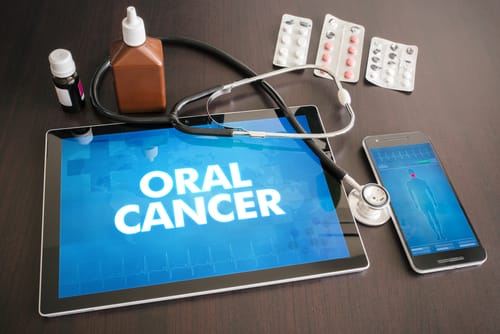Enhancing Your Health with Oral Cancer Screenings
Oral cancer is a serious condition that affects the mouth and can have devastating consequences if not detected and treated early. It is estimated that nearly 54,000 Americans are diagnosed with oral or oropharyngeal cancer each year, highlighting the importance of early detection and treatment.
Oral cancer screenings play a vital role in identifying signs of oral cancer before symptoms develop. These screenings are typically performed by healthcare providers, including dentists, as part of routine check-ups.
In this blog, we will explore the importance of oral cancer screenings, the process involved in oral cancer screening, the advanced technologies used, and the steps to interpret screening results. Additionally, we will discuss the risk factors for oral cancer and the preventive measures that can be taken to lower the risk of developing the disease. It’s essential to understand the significance of oral cancer screenings and proactively take steps to protect our oral health every step of the way.
Understanding Oral Cancer Screening
Oral cancer screening is a vital tool in the early detection and diagnosis of oral cancer. The process involves a thorough examination of the oral cavity to identify any signs or symptoms of cancer. Early detection is crucial in improving the chances of successful treatment and survival.
Oral cancer is a type of cancer that can affect various parts of the mouth, including the lips, tongue, gums, cheeks, and throat. It is often associated with risk factors such as tobacco use, excessive alcohol consumption, and exposure to human papillomavirus (HPV). However, it’s important to note that oral cancer can affect anyone, regardless of their risk factors.
The primary goal of oral cancer screening is to identify any abnormal tissue or lesions that may indicate the presence of cancer. By conducting these regular oral cancer screenings, individuals can take a proactive approach to their oral health and increase their chances of detecting oral cancer at an early stage. Early detection allows for prompt treatment and a higher likelihood of a positive outcome.
The Screening Process at Creekside Family Dental
At Creekside Family Dental, we prioritize the oral health of our patients. As part of our comprehensive dental care, we offer thorough oral cancer screenings to detect any signs or symptoms of oral cancer.
During an oral cancer screening at our office, our experienced dentists will visually examine your oral cavity, including the lining of your cheeks, gums, lips, tongue, and floor and roof of your mouth. We will also use palpation to feel for any lumps or bumps in your face, neck, and jaw. The screening process is usually quick and painless, taking less than five minutes to complete. It is typically performed as part of a routine dental or physical checkup.
To enhance the detection of abnormal tissue, specialized tools like blue dye and special lights may be used. Blue dye can help identify areas that are likely to become cancerous, while special lights can reveal abnormal tissues that may not be visible to the naked eye.
By choosing Creekside Family Dental for your oral cancer screenings, you can rest assured that your oral health is in safe hands. Our knowledgeable and compassionate team is dedicated to providing the highest quality of care and ensuring your overall well-being.
Preparing for Your Oral Cancer Screening & What to Expect
Preparing for an oral cancer screening is simple and requires minimal effort. There are no specific steps or precautions that need to be taken before the screening.
The screening is usually conducted during a routine dental or physical checkup. Therefore, it is important to ensure that you have scheduled an appointment with your healthcare provider.
Before your screening, it is advisable to maintain good oral hygiene by brushing your teeth and flossing. This will help ensure a clear view of your oral cavity during the examination.
If you have any concerns or questions about the screening process, it is recommended to discuss them with our team before the appointment. We will be able to provide you with all the necessary information and address any concerns you may have.
By preparing for your oral cancer screening and taking an active role in your oral health, you are taking an important step toward early detection and prevention of oral cancer.
Advanced Technologies Used in Screening
Oral cancer screenings have been enhanced by the use of advanced technologies, which improve the accuracy and efficiency of the screening process.
One such technology is the use of special lights that can help identify abnormal tissues in the oral cavity. During this screening method, the patient rinses their mouth with a fluorescent mouthwash. The healthcare provider then shines a special light into the mouth, which makes healthy tissue appear dark and abnormal tissue appear white. This allows for easier identification of potential areas of concern.
Another advanced technology used in oral cancer screenings is the microscope. The use of a microscope enables the healthcare provider to examine cells and tissues at a microscopic level, allowing for a more detailed analysis. Microscopic examination can help detect any subtle abnormalities that may not be visible to the naked eye.
These advanced technologies, along with visual and physical examinations, enhance the accuracy and effectiveness of oral cancer screenings. By utilizing these tools, healthcare providers can detect oral cancer at its early stages and provide timely treatment, ultimately improving patient outcomes.
Risk Factors for Oral Cancer
Understanding the risk factors for oral cancer is essential in identifying individuals who may be at a higher risk of developing the disease. While anyone can develop oral cancer, certain factors increase the likelihood of its occurrence.
Tobacco Use: Tobacco use, including smoking cigarettes, cigars, or pipes, is one of the most significant risk factors for oral cancer. The chemicals present in tobacco products can damage the cells in the oral cavity and increase the risk of cancer.
Excessive Alcohol Consumption: Another risk factor for oral cancer is excessive alcohol consumption. Alcohol can irritate the tissues in the oral cavity and make them more susceptible to the growth of cancerous cells.
Human Papillomavirus: Human papillomavirus (HPV) infection is also linked to an increased risk of oral cancer. HPV is a sexually transmitted infection that can affect the tissues in the mouth and throat, potentially leading to cancer.
It’s important to note that having one or more of these risk factors does not guarantee the development of oral cancer. However, individuals with these risk factors should be particularly vigilant about oral health and consider regular oral cancer screenings as part of their preventive care routine.
Contact Our Office to Schedule Your Oral Cancer Screening
Creekside Family Dental prioritizes your well-being by advocating for oral health through timely screenings. Stay informed, stay proactive, and take charge of your well-being. Your commitment to preventive care today can make a difference in your future health outcomes. Contact our team to schedule your screening today!
Frequently Asked Questions
What is the importance of oral cancer screenings in maintaining good health?
Oral cancer screenings are essential for maintaining good health as they allow for early detection and diagnosis of oral cancer. Early detection significantly improves the chances of successful treatment and increases the chances of survival.
How often should I undergo an oral cancer screening?
The frequency of oral cancer screenings may vary depending on individual risk factors and recommendations from healthcare providers. In general, it is advisable to undergo an oral cancer screening at least once a year or as recommended by your healthcare provider.
Are there any specific risk factors that increase the likelihood of developing oral cancer?
Yes, several risk factors can increase the likelihood of developing oral cancer. These include tobacco use, excessive alcohol consumption, and exposure to human papillomavirus (HPV). It’s important to note that having these risk factors does not guarantee the development of oral cancer, but they can increase the risk.


 Meet Dr. Leffler
Meet Dr. Leffler
 Meet the Team
Meet the Team
 Dental Membership Plan
Dental Membership Plan
 Insurance Information
Insurance Information
 Patient Forms
Patient Forms
 Online Bill Pay
Online Bill Pay
 Your First Visit
Your First Visit





